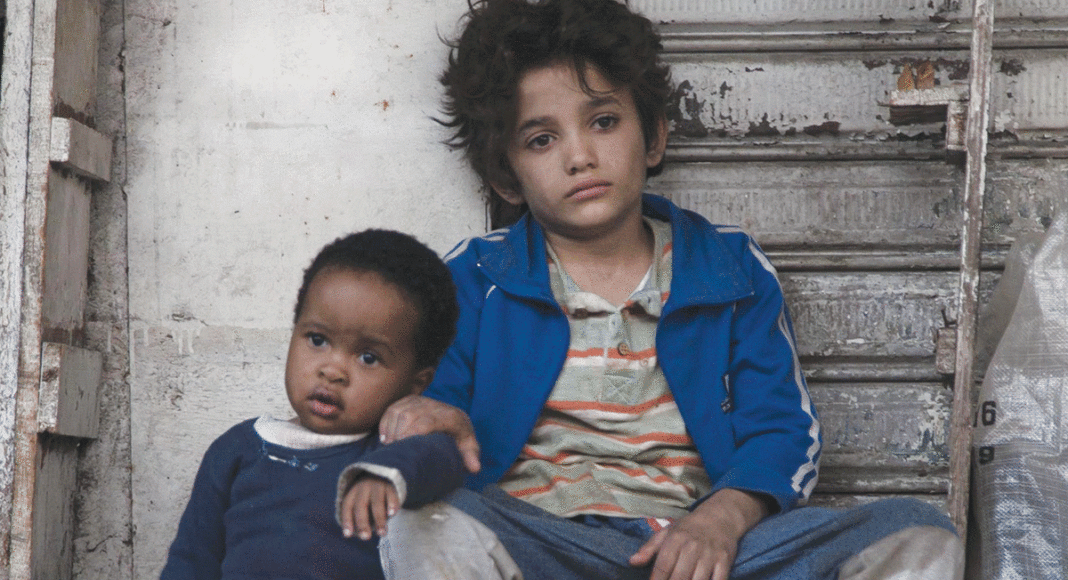We hear a lot about refugees fleeing violence and poverty in war-torn countries. They swarm across borders in caravans, we’re warned, or sneak in by stealth. Most of us understand that these people are seeking a better life, or a chance to survive at all. But that doesn’t necessarily mean we can imagine the kind of desperation that would drive anyone to leave behind everything they know and risk so much for such an uncertain fate.
It’s a situation Lebanese filmmaker Nadine Labaki addresses in Capernaum. Nominated for this year’s Foreign Language Oscar, it’s the often harrowing, deeply engrossing tale of a 12-year-old boy struggling to navigate the world the grown-ups have made—indifferent, at best, and carelessly brutal—in the refugee-haunted slums of Beirut. In Capernaum (the word loosely translates as “chaos”), Labaki puts a strikingly human face on a shadow existence so untenable that the dream of escape is the only possible response.
Zain (the remarkable young Zain Al Rafeea) is the eldest child in a family of Syrian refugees who occupy a crumbling Beirut tenement. His short-fused father and volatile mother (Kawsar Al Haddad) are likely to smack him at any moment, and he has too many younger siblings to count. When his parents sell his 11-year-old sister into marriage (kicking and screaming all the way), and Zain can’t protect her, he heads out on his own.
Scavenging food and sleeping in a Ferris Wheel car at an amusement park, he’s noticed by Rahil (Yordanos Shiferaw), an Ethiopian refugee who works in the kitchen at the carnival cafe. Rahil has a secret of her own: not only is she “illegal” (her work permit is forged), she has a toddler who sleeps hidden in her backpack while she works.
Rahil invites Zain home to her tiny, ramshackle lean-to, and feeds and bathes him alongside her little boy, Yonas (winsome Boluwatife Treasure Bankole, whose gleeful good cheer and eager curiosity delight viewers throughout the film). Rahil strikes a bargain with Zain to provide him food and shelter if he will stay home and mind little Yonas during the day while she is at work.
Within this framework of plot, Labaki paints a broader portrait of the perilous lives of undocumented immigrants on foreign soil. Rahil and the other African women who clean and scrub around the amusement park are wholly dependent on the surly tough guy in the marketplace who forges their work permits for them. They live in fear of being herded up and caged, en masse, like animals. A Syrian girl Zain meets in the marketplace (she’s peddling a handmade wreath, he’s trying to sell a couple of Rahil’s meager pots to feed the baby) infects him with her fantasy of Sweden—a Utopia where everyone lives in a house, breathes fresh air and has plenty of food to eat.
In young Al Rafeea, a real-life Syrian transplant and first-time actor found on the streets of Beirut, Labaki has found the perfect vessel to express her views on the refugee experience. His Zain is aggressive and foul-mouthed, like his father, but quick-witted and resourceful, too. He rigs up a mirror outside Rahil’s window so he and Yonas can watch cartoons from the neighbor’s TV—then makes up scatological dialogue to fit the images.
But Zain also has the capacity to care deeply about others, and develop an unshakable sense of loyalty to them. He shows far more responsibility and initiative in caring for little Yonas than his own parents ever showed toward him—especially after Rahil disappears. It’s the plight of children like Zain, thrust into a baffling world through no fault of their own, that Labaki strives to illuminate. And it’s Zain’s response to that world—first, in a courtroom, on trial for a violent crime, then in a stark manifesto he calls in to a local radio show—that gives Labaki’s film its urgency and power.
CAPERNAUM
*** (out of four)
With Zain Al Rafeea, Yordanos Shiferaw and Kawsar Al Haddad. Written and directed by Nadine Labaki. A Sony Classics release. Rated R. 126 minutes. In Arabic and Amharic, with English subtitles.














